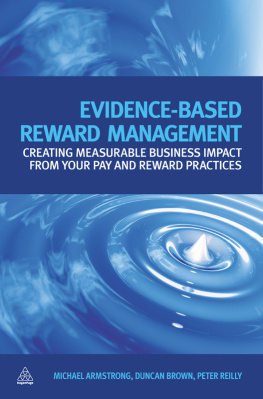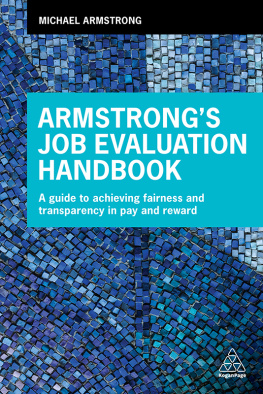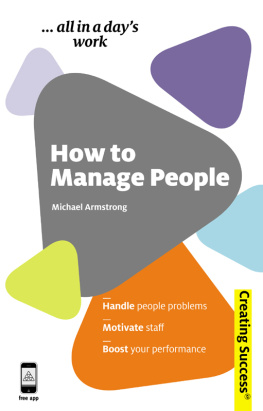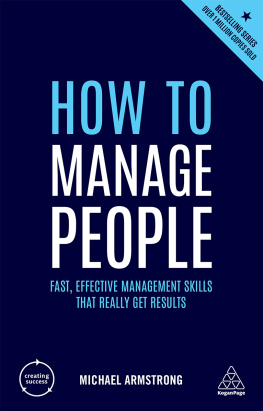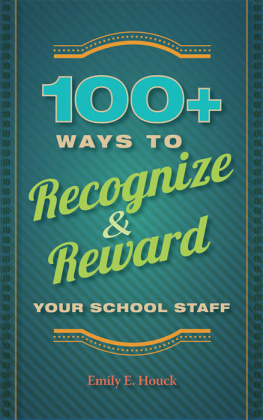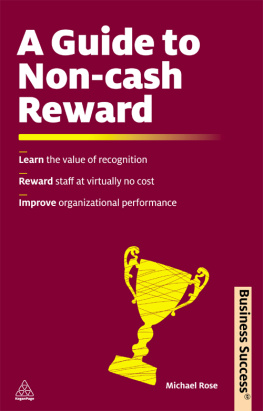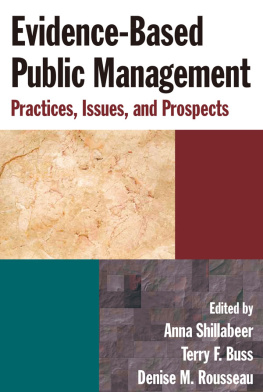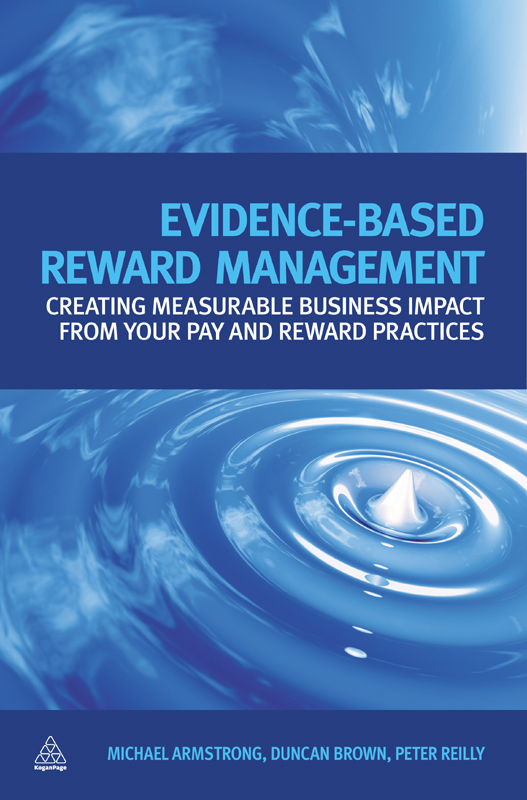EVIDENCE-BASED
REWARD MANAGEMENT
Creating measurable business impact
from your pay and reward practices
Michael Armstrong,
Duncan Brown,
Peter Reilly
Publishers note
Every possible effort has been made to ensure that the information contained in this book is accurate at the time of going to press, and the publishers and authors cannot accept responsibility for any errors or omissions, however caused. No responsibility for loss or damage occasioned to any person acting, or refraining from action, as a result of the material in this publication can be accepted by the editor, the publisher or any of the authors.
First published in Great Britain and the United States in 2010 by Kogan Page Limited
Apart from any fair dealing for the purposes of research or private study, or criticism or review, as permitted under the Copyright, Designs and Patents Act 1988, this publication may only be reproduced, stored or transmitted, in any form or by any means, with the prior permission in writing of the publishers, or in the case of reprographic reproduction in accordance with the terms and licences issued by the CLA. Enquiries concerning reproduction outside these terms should be sent to the publishers at the undermentioned addresses:
120 Pentonville Road London N1 9JN United Kingdom www.koganpage.com | 525 South 4th Street, #241 Philadelphia PA 19147 USA | 4737/23 Ansari Road Daryaganj New Delhi 110002 India |
Michael Armstrong, Duncan Brown and Peter Reilly, 2010
The right of Michael Armstrong, Duncan Brown and Peter Reilly to be identified as the authors of this work has been asserted by them in accordance with the Copyright, Designs and Patents Act 1988.
ISBN 978 0 7494 5656 6
E-ISBN 978 0 7494 5938 3
British Library Cataloguing-in-Publication Data
A CIP record for this book is available from the British Library.
Library of Congress Cataloging-in-Publication Data
Armstrong, Michael, 1928
Evidence-based reward management: creating measurable business impact from your pay and reward practices / Michael Armstrong, Duncan Brown, Peter Reilly. 1st ed.
p. cm.
Includes bibliographical references and index.
ISBN 978-0-7494-5656-6 ISBN 978-0-7494-5938-3 1. Incentives in industry. 2. Employee motivation. I. Brown, Duncan, 1960 II. Reilly, Peter A. (Peter Andrew), 1952 III. Title.
HF5549.5.I5A667 2010
658.3142dc22
2010002759
Typeset and eBook by Graphicraft Limited, Hong Kong
Printed and bound in India by Replika Press Pvt Ltd
Contents
We acknowledge gratefully the enormous help, honesty and openness provided by the following with their case descriptions:
Neal Blackshire, McDonalds;
Liz Booth, NSPCC;
Dr Neil Cuthbertson and Dr Tim Miller, Standard Chartered Bank;
Samantha Gee, KPMG;
Head of Reward and Development, Technology company;
Colin Miller and Lindsay Horne, Kent County Council;
Stuart Nolan, DSG International.
We also acknowledge with thanks the following for their support and the descriptions they provided of their review methods:
Colin Evans and Helen Murlis, Hay Group;
Jeremy Griffiths, Maritz Research;
Carole Hathaway and Chantal Free, Watson Wyatt.
Successful reward policies make a material difference to the performance of an organization. Challenging HR to consistently adopt the disciplines routinely used for other investment decisions is the right approach.
Imelda Walsh, HR Director, Sainsbury
Ive often likened the effectiveness of reward to the performance of a car engine, ie is it firing on all cylinders and if not which ones are working and which arent? This book provides the tools and thinking to help you get under the bonnet of your car and understand how it can perform even better.
Stuart Nolan, Group Reward Director, DSG international plc
The appropriate measurement and application of reward practices within an organization is a critical element in maximizing employee engagement. A fair and balanced approach to remuneration inspires employees to build sustainable business performance. Duncan Browns innovative approach and advice on reward management is an essential read for any HR professional.
Tim Miller, Director, Property, Research & Assurance and Chairman, Standard Chartered Korea
This book is what pragmatic, business-focused HR Directors have been waiting for, for years; how to justify the huge spend on rewards with hard data. Another milestone on the journey of HR from overhead to true business partner.
Carolyn Gray, Group HR Director, Guardian Media Group
This book will move reward management from I think to I know and make the management of reward much more effective.
For too long reward professionals have used the excuse that measurement of the effect of reward programmes is just too difficult. This book by Michael Armstrong, Duncan Brown and Peter Reilly shows that it can and must be done to improve effectiveness.This book confirms that few organizations measure the intent or effectiveness of their reward programmes, but more importantly it outlines why they should do it and how to do it. Improved effectiveness for the profession and organizations will follow if they apply the learning in this book.
This book learns from its own perspective by providing the evidence for evidence-based reward and does it from an academic, research and practical perspective which will make a massive contribution to improving the effectiveness of reward.
Clive Wright, Chair of the CIPD Reward Forum and Managing Director of Hyperion HR
An invaluable and powerful reminder of the vital part research and evaluation plays in keeping reward policies fresh and relevant to the achievement of culture change and hard business objectives.
Peter Bennett, Director Human Resources, Network Rail
It is hoped the firm of the future will be able to establish compensation policies based on empirical evidence about the behavioral effects of money as an incentive rather than on non-tested assumptions, hunches and time-worn rules of thumb so common in industry today.
Opsahl and Dunnette (1966)
HR leaders are unable to describe their contribution to value added except in trendy, unquantifiable and wannabe terms.
Stewart (1996)
My concern, as with much in the field of human resource management, is that few (if any) organizations are good at setting in place feedback and double loop learning processes that help them manage reward system change more effectively.
Thompson (1998)
What score would you award the reward practices in your organization, on a scale from 1 to 10? As we document later, what is perhaps most worrying about the UK pay and reward situation at the moment is not just the middling responses that a question like this generally elicits, but more fundamentally the lack of any clear criteria and evidence with which to make and justify such an assessment. We believe that an evidence-based approach to reward management is necessary.
Evidence-based reward management is based on the concept of evidence-based management. This is the process of ensuring that decisions and proposals on the development and application of management practices are backed up with hard data derived from research, benchmarking and the analysis and evaluation of the organizational context and management activities. The philosophy of evidence-based management can be traced back to the logical positivists (Ayer, 1946), who stated that it was essential to develop understanding by answering the two questions: What is it that you think you know? and How do you know it? Their views were extended by Quine (1970) who emphasized that any statements of belief have to face the tribunal of experience.

